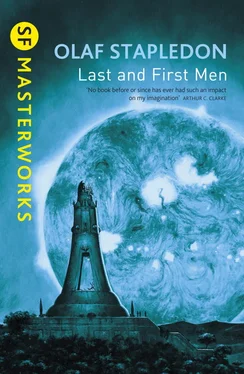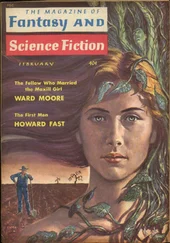Conceive, then, a small and curiously sober people established east of the ancient Bahia Blanca, and advancing century by century over the plains and up the valleys. In time it reached and encircled the heights which were once the island of South Georgia, while to the north and west it spread into the Brazilian highlands and over the Andes. Definitely of higher type than any of their neighbours, definitely more vigorous and acute, the Patagonians were without serious rivals. And since by temperament they were peaceable and conciliatory, their cultural progress was little delayed, either by military imperialism or internal strife. Like their predecessors in the northern hemisphere, they passed through phases of disruption and union, retrogression and regeneration; but their career was on the whole more steadily progressive, and less dramatic, than anything that had occurred before. Earlier peoples had leapt from barbarism to civil life and collapsed again within a thousand years. The slow march of the Patagonians took ten times as long to pass from a tribal to a civic organization.
Eventually they comprised a vast and highly organized community of autonomous provinces, whose political and cultural centre lay upon the new coast north-east of the ancient Falkland Islands, while its barbarian outskirts included much of Brazil and Peru. The absence of serious strife between the various parts of this “empire” was due partly to an innately pacific disposition, partly to a genius for organization. These influences were strengthened by a curiously potent tradition of cosmopolitanism, or human unity, which had been born in the agony of disunion before the days of the World State, and was so burnt into men’s hearts that it survived as an element of myth even through the Dark Age. So powerful was this tradition, that even when the sailing ships of Patagonia had founded colonies in remote Africa and Australia, these new communities remained at heart one with the mother country. Even when the almost Nordic culture of the new and temperate Antarctic coasts had outshone the ancient centre, the political harmony of the race was never in danger.
The Patagonians passed through all the spiritual phases that earlier races had experienced, but in a distinctive manner. They had their primitive tribal religion, derived from the dark past, and based on the fear of natural forces. They had their monotheistic impersonation of Power as a vindictive Creator. Their most adored racial hero was a god-man who abolished the old religion of fear. They had their phases, also, of devout ritual and their phases of rationalism, and again their phases of empirical curiosity.
Most significant for the historian who would understand their special mentality is the theme of the god-man; so curiously did it resemble, yet differ from, similar themes in earlier cultures of the first human species. He was conceived as eternally adolescent, and as mystically the son of all men and women. Far from being the Elder Brother, he was the Favourite Child; and indeed he epitomizes that youthful energy and enthusiasm which the race now guessed was slipping away from it. Though the sexual interest of this people was weak, the parental interest was curiously strong. But the worship of the Favourite Son was not merely parental; it expressed also both the individual’s craving for his own lost youth, and his obscure sense that the race itself was senescent.
It was believed that the prophet had actually lived a century as a fresh adolescent. He was designated the Boy who Refused to Grow Up. And this vigour of will was possible to him, it was said, because in him the feeble vitality of the race was concentrated many millionfold. For he was the fruit of all parental passion that ever was and would be; and as such he was divine. Primarily he was the Son of Man, but also he was God. For God, in this religion, was no prime Creator but the fruit of man’s endeavour. The Creator was brute power, which had quite inadvertently begotten a being nobler than itself. God, the adorable, was the eternal outcome of man’s labour in time, the eternally realized promise of what man himself should become. Yet though this cult was based on the will for a young-hearted future, it was also overhung by a dread, almost at times a certainty, that in fact such a future would never be, that the race was doomed to grow old and die, that spirit could never conquer the corruptible flesh, but must fade and vanish. Only by taking to heart the message of the Divine Boy, it was said, could man hope to escape this doom.
Such was the legend. It is instructive to examine the reality. The actual individual, in whom this myth of the Favourite Son was founded, was indeed remarkable. Born of shepherd parents among the Southern Andes, he had first become famous as the leader of a romantic “youth movement”; and it was this early stage of his career that won him followers. He urged the young to set an example to the old, to live their own life undaunted by conventions, to enjoy, to work hard but briefly, to be loyal comrades. Above all, he preached the religious duty of remaining young in spirit. No one, he said, need grow old, if he willed earnestly not to do so, if he would but keep his soul from falling asleep, his heart open to all rejuvenating influences and shut to every breath of senility. The delight of soul in soul, he said, was the great rejuvenator; it recreated both lover and beloved. If Patagonians would only appreciate each other’s beauty without jealousy, the race would grow young again. And the mission of his ever-increasing Band of Youth was nothing less than the rejuvenation of man.
The propagation of this attractive gospel was favoured by a seeming miracle. The prophet turned out to be biologically unique among Patagonians. When many of his coevals were showing signs of senescence, he remained physically young. Also he possessed a sexual vigour which to the Patagonians seemed miraculous. And since sexual taboo was unknown, he exercised himself so heartily in love-making, that he had paramours in every village, and presently his offspring were numbered in hundreds. In this respect his followers strove hard to live up to him, though with small success. But it was not only physically that the prophet remained young. He preserved also a striking youthful agility of mind. His sexual prodigality, though startling to his contemporaries, was in him a temperate overflow of surplus energy. Far from exhausting him, it refreshed him. Presently, however, this exuberance gave place to a more sober life of work and meditation. It was in this period that he began to differentiate himself mentally from his fellows. For at twenty-five, when most Patagonians were deeply settled into a mental groove, he was still battling with successive waves of ideas, and striking out into the unknown. Not till ime was forty, and still physically in earlier prime, did he gather his strength and deliver himself of his mature gospel. This, his considered view of existence, turned out to be almost unintelligible to Patagonians. Though in a sense it was an expression of their own culture, it was an expression upon a plane of vitality to which very few of them could ever reach.
The climax came when, during a ceremony in the supreme temple of the capital city, while the worshippers were all prostrated before the hideous image of the Creator, the ageless prophet strode up to the altar, regarded first the congregation and then the god, burst into a hearty peal of laughter, slapped the image resoundingly, and cried, “Ugly, I salute you! Not as almighty, but as the greatest of all jokers. To have such a face, and yet to be admired for it! To be so empty, and yet so feared!” Instantly there was a hubbub. But such was the young iconoclast’s god-like radiance, confidence, unexpectedness, and such his reputation as the miraculous Boy, that when he turned upon the crowd, they fell silent, and listened to his scolding.
Читать дальше











